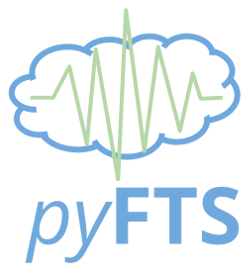pyFTS.partitioners package¶
Module contents¶
Module for pyFTS Universe of Discourse partitioners.
Submodules¶
pyFTS.partitioners.partitioner module¶
- class pyFTS.partitioners.partitioner.Partitioner(**kwargs)[source]¶
Bases:
objectUniverse of Discourse partitioner. Split data on several fuzzy sets
- build(data)[source]¶
Perform the partitioning of the Universe of Discourse
- Parameters
data – training data
- Returns
- check_bounds(data)[source]¶
Check if the input data is outside the known Universe of Discourse and, if it is, round it to the closest fuzzy set.
- Parameters
data – input data to be verified
- Returns
the index of the closest fuzzy set when data is outside de universe of discourse or None if
the data is inside the UoD.
- fuzzyfy(data, **kwargs)[source]¶
Fuzzyfy the input data according to this partitioner fuzzy sets.
- Parameters
data – input value to be fuzzyfied
alpha_cut – the minimal membership value to be considered on fuzzyfication (only for mode=’sets’)
method – the fuzzyfication method (fuzzy: all fuzzy memberships, maximum: only the maximum membership)
mode – the fuzzyfication mode (sets: return the fuzzy sets names, vector: return a vector with the membership
values for all fuzzy sets, both: return a list with tuples (fuzzy set, membership value) )
:returns a list with the fuzzyfied values, depending on the mode
- get_name(counter)[source]¶
Find the name of the fuzzy set given its counter id.
- Parameters
counter – The number of the fuzzy set
- Returns
String
- kdtree: scipy.spatial._kdtree.KDTree¶
A spatial index to help in fuzzyfication
- lower_margin: float¶
Specific lower exceeding margins for the known UoD. The default value is the self.margin parameter
- lower_set()[source]¶
Return the fuzzy set on lower bound of the universe of discourse.
- Returns
Fuzzy Set
- membership_function¶
Fuzzy membership function (pyFTS.common.Membership)
- partitions: int¶
The number of universe of discourse partitions, i.e., the number of fuzzy sets that will be created
- plot(ax, rounding=0)[source]¶
Plot the partitioning using the Matplotlib axis ax
- Parameters
ax – Matplotlib axis
- plot_set(ax, s)[source]¶
Plot an isolate fuzzy set on Matplotlib axis
- Parameters
ax – Matplotlib axis
s – Fuzzy Set
- search(data, **kwargs)[source]¶
Perform a search for the nearest fuzzy sets of the point ‘data’. This function were designed to work with several overlapped fuzzy sets.
- Parameters
data – the value to search for the nearest fuzzy sets
type – the return type: ‘index’ for the fuzzy set indexes or ‘name’ for fuzzy set names.
results – the number of nearest fuzzy sets to return
- Returns
a list with the nearest fuzzy sets
- setnames: list¶
list of partitions names. If None is given the partitions will be auto named with prefix
- transformation¶
data transformation to be applied on data
- upper_margin: float¶
Specific upper exceeding margins for the known UoD. The default value is the self.margin parameter
- upper_set()[source]¶
Return the fuzzy set on upper bound of the universe of discourse.
- Returns
Fuzzy Set
- variable¶
In a multivariate context, the variable that contains this partitioner
pyFTS.partitioners.Class module¶
Class Partitioner with Singleton Fuzzy Sets
- class pyFTS.partitioners.Class.ClassPartitioner(**kwargs)[source]¶
Bases:
pyFTS.partitioners.partitioner.PartitionerClass Partitioner: Given a dictionary with class/values pairs, create singleton fuzzy sets for each class
pyFTS.partitioners.CMeans module¶
pyFTS.partitioners.Entropy module¶
C. H. Cheng, R. J. Chang, and C. A. Yeh, “Entropy-based and trapezoidal fuzzification-based fuzzy time series approach for forecasting IT project cost,” Technol. Forecast. Social Change, vol. 73, no. 5, pp. 524–542, Jun. 2006.
- class pyFTS.partitioners.Entropy.EntropyPartitioner(**kwargs)[source]¶
Bases:
pyFTS.partitioners.partitioner.PartitionerHuarng Entropy Partitioner
pyFTS.partitioners.FCM module¶
S. T. Li, Y. C. Cheng, and S. Y. Lin, “A FCM-based deterministic forecasting model for fuzzy time series,” Comput. Math. Appl., vol. 56, no. 12, pp. 3052–3063, Dec. 2008. DOI: 10.1016/j.camwa.2008.07.033.
pyFTS.partitioners.Grid module¶
Even Length Grid Partitioner
- class pyFTS.partitioners.Grid.GridPartitioner(**kwargs)[source]¶
Bases:
pyFTS.partitioners.partitioner.PartitionerEven Length Grid Partitioner
- class pyFTS.partitioners.Grid.PreFixedGridPartitioner(**kwargs)[source]¶
Bases:
pyFTS.partitioners.Grid.GridPartitionerPrefixed UoD with Even Length Grid Partitioner
pyFTS.partitioners.Huarng module¶
pyFTS.partitioners.Singleton module¶
Even Length Grid Partitioner
- class pyFTS.partitioners.Singleton.SingletonPartitioner(**kwargs)[source]¶
Bases:
pyFTS.partitioners.partitioner.PartitionerSingleton Partitioner: Create singleton fuzzy sets for each distinct value in UoD
pyFTS.partitioners.Simple module¶
Simple Partitioner for manually informed fuzzy sets
- class pyFTS.partitioners.Simple.SimplePartitioner(**kwargs)[source]¶
Bases:
pyFTS.partitioners.partitioner.PartitionerSimple Partitioner for manually informed fuzzy sets
pyFTS.partitioners.SubClust module¶
Chiu, Stephen L. “Fuzzy model identification based on cluster estimation.” Journal of Intelligent & fuzzy systems 2.3 (1994): 267-278.
- class pyFTS.partitioners.SubClust.SubClustPartitioner(**kwargs)[source]¶
Bases:
pyFTS.partitioners.partitioner.PartitionerSubtractive Clustering Partitioner
